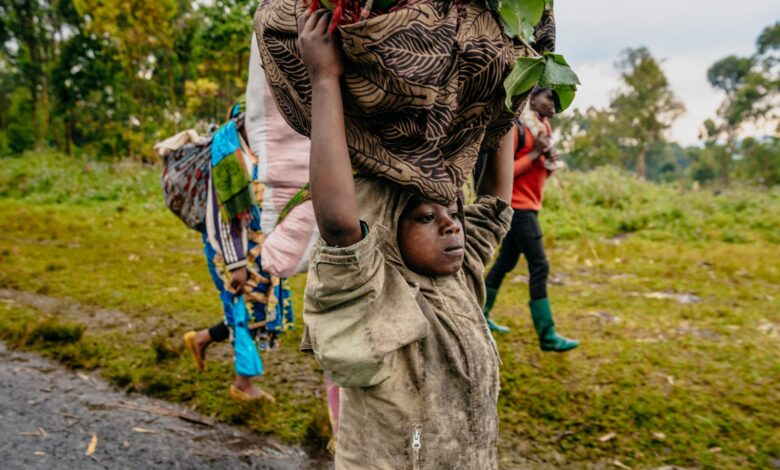Thousands Displaced As M23 Rebels, Congolese Army Clash
Humanitarian organisations are alarmed at an increasing number of attacks by M23 that have displaced 37,000 people in DR Congo’s North Kivu.

At least 37,000 people have been forced to leave their homes in North Kivu province as renewed fighting between the Armed Forces of the Democratic Republic of the Congo (FARDC) and M23 rebels entered the fourth day.
The violence, which began on Sunday, May 22, has spread to Nyiragongo —the site of a devastating volcanic eruption in 2021, causing double displacement in DR Congo’s eastern region.
The displaced people fled to neighbouring villages in the north and south of Goma, North Kivu’s capital. In Nyiragongo territory, at least 10,855 people from Kibumba have fled to Kibati, Kanyaruchinya and Goma since Tuesday, May 24.
In Rutshuru territory, about 26,000 people have been displaced since the violence began. 1,500 of them fled to Uganda and the remaining 24,000 are spread across villages in the Rwanguba Health Zone, according to the United Nations humanitarian agency (OCHA)
The Norwegian Refugee Council (NRC) and the International Rescue Committee (IRC) on Friday, May 27, warned that the humanitarian situation is dire as displaced families who have found shelter in local churches and schools near Goma are left without aid supplies.
“Thousands of families have been forced to flee the renewed wave of violence. Some had to walk for more than 20 kilometres to arrive in the outskirts of Goma, and more are reported to be on their way,” Caitlin Brady, NRC’s country director in the Democratic Republic of the Congo (DRC), said.
“This morning NRC staff visited sites where the displaced people are arriving. They urgently need food, drinking water, latrines, and emergency shelter,” the International Rescue Committee (IRC) said that it was closely monitoring the situation on the ground.
“The objective for now is to protect our teams who are providing humanitarian assistance in the areas affected by the clashes,” Adama Coulibaly, IRC’s Country Director, said.
The NRC and the IRC said they were concerned that the intensity and rapid spread of violence to neighbouring areas would severely hamper humanitarian access to already vulnerable families.
According to the aid organisations, the latest escalation of violence has threatened the humanitarian community’s capacity to provide timely support in a region where 1.9 million people have already been displaced.
At least 19,000 people, who fled to the border with Uganda, remain deprived of vital assistance, as heavy fighting has disrupted aid delivery.
“Unhindered access and timely delivery of humanitarian assistance is fundamental for the protection of all displaced and conflict-affected populations,” Brady said.
“Proper assistance to families in need can only be delivered on the grounds of lasting peace and stability.”
Who are the M23 rebels?
North Kivu has been the threatre of clashes between the Congolese military and armed militant groups, with the M23 rebels, being prominent among them.
The M23, known as the March 23 movement, is a former Tutsi rebellion which was allegedly founded and sponsored by the Rwandan and Ugandan governments in its early days, according to a UN report.
Although both countries denied backing the rebellion, the report said Rwanda ceased its support following international pressure.
In 2013, M23 was defeated by the Congolese military and the UN peacekeepers after it took control of Goma.
But in 2021, the M23 rebels re-emerged from demobilisation camps, blaming the Congolese government for not honouring its commitments to them. Ever since, the group has intensified their attacks.
In the latest clashes, the M23 rebels said elements of FDLR (Democratic Forces for Liberation of Rwanda), the Rwandan Hutu rebels who take refuge in DRC, had reinforced the Congolese army in its attacks on some of their bases on Sunday morning.
This happens amid peace talks being held in Nairobi, Kenya where all parties to the conflict are discussing security arrangements.
Call
The NRC and IRC called on all actors to seek solutions for a lasting peace “not only in DR Congo, but also in the wider Great Lakes Region. ”
“They must do everything in their power to prevent the return to full-scale war in the region.”
Congolese lawmakers have also urged the country’s government to demand that the UN and the African Union declare the M2 rebel movement a terror group.
Support Our Journalism
There are millions of ordinary people affected by conflict in Africa whose stories are missing in the mainstream media. HumAngle is determined to tell those challenging and under-reported stories, hoping that the people impacted by these conflicts will find the safety and security they deserve.
To ensure that we continue to provide public service coverage, we have a small favour to ask you. We want you to be part of our journalistic endeavour by contributing a token to us.
Your donation will further promote a robust, free, and independent media.
Donate HereStay Closer To The Stories That Matter




